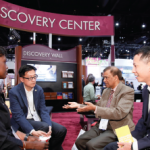The Teaching Fellows in Lupus Project provides a vivid example of how ACR members can see their ideas come to life. Amanda Sammut, MD, assistant clinical professor of medicine at Columbia University Division of Rheumatology, came up with the idea of utilizing fellows to educate non-rheumatologists about lupus and in 2015 the ACR helped that idea come to life. The project began in 2015 as a collaborative effort between the ACR and the Lupus Research Institute, now known as the Lupus Research Alliance. ACR members representing the University of California San Francisco, Northwestern University, Emory University and Harlem Hospital Center were the first to work with participating rheumatology fellows who were trained to educate frontline providers about lupus using a standardized presentation created by the ACR.
“It has evolved into making the Teaching Fellows in Lupus program a standard for COIN, and we’ve had great participation and interest from fellows and their program directors around the country,” says Sherry J. Williams, COIN consultant. “We are trying to increase the level of knowledge of these frontline providers in order to increase the diagnosis of lupus.”
At these sessions, fellows discuss the presenting signs and symptoms of lupus, when to refer a suspected lupus case to a rheumatologist, how to initiate a lupus workup, and general information on lupus epidemiology, health disparities among populations affected by lupus, and genetics. Fellows are also responsible for recruiting local providers. Sessions attract anywhere from three to more than 30 attendees. Six fellows are participating this year from four programs: University of Alabama Birmingham, Saint Louis University, the University of Chicago and the University of Ottawa. In 2018, the program held its first virtual online training session for 92 participants.
“This program gives our fellows an opportunity to learn more about lupus as well, and how to work with frontline providers, because as rheumatologists, they will be doing that,” says Ms. Williams. “They also get a chance to hone their presentation skills.”
Ms. Williams and a COIN staff member, L. Beaman Morris, review program directors’ feedback about the project, which they say has been very positive so far. One fellow from the program will be selected, based on directors’ nominations, to deliver the educational presentation at a Program Directors Forum at the 2018 ACR/ARHP Annual Meeting in Chicago.
COIN staff is trying to evaluate the program’s outcomes, including measuring the change in lupus awareness and any increase in the recognition of the lupus diagnosis process, according to Ms. Williams. “One new thing we did this year was to focus on more than just the signs and symptoms of lupus, but the impact of lupus on a patient’s life,” she says. Fellows help local providers appreciate the importance of treatment for the patient’s quality of life.


